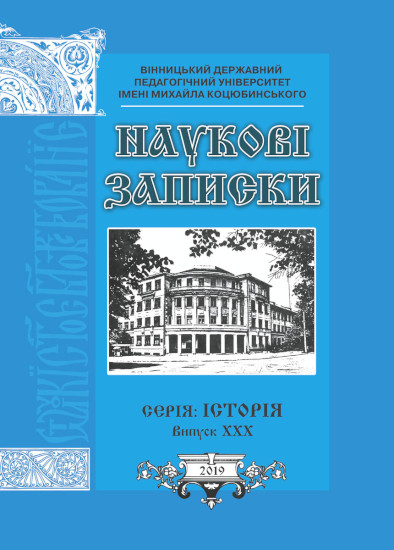Abstract
The article explores the features of the national policy of the USSR during the years of perestroika. The author analyzes the changes in the program documents of the Communist Party of the Soviet Union and focuses on changes in the political course of power to relations in a multinational society. The study argues that the rejection of the authoritarian type of behavior in solving the national question was by no means intended to radically change the principles and strategic objectives of the policy regarding ethnic communities. The democratization of society contributed to the growth of national movements, and then the emergence of centrifugal trends. After the first ethnic conflicts in country, party and state leaders of USSR rated the gaps in legislation of national relations, but stop the increase of interethnic conflicts that again broke out in the USSR in 1989-1990, could almost not. The slogans of perestroika contributed to the politicization of society, and unresolved national problems contributed to the radicalization of political processes.
Among the main causes of aggravation of national problems during the perestroika was the outdated legal framework on the national issue in the Soviet Union. In fact, a legal vacuum was created regarding the extension of rights of national communities, which did not correspond in any way to the internal processes taking place in the country. The issues of national education, culture, religion, revival of national mass media, formation of public national-cultural societies were not regulated. The vast majority of newly formed national associations in the USSR had semi-legal status during the perestroika. In the first phase of restructuring, all-Union legislation was primarily aimed at supporting economic reform, and legal regulation of issues related to national policy began only in 1990.
The country's political power was gradually plunged into the chaos of the political and socio-economic crisis in the late 1980s and early 1990s, lost control of the situation, and failed to offer either society or the republican national elites a new political course and practical model of resolving contradictions in national relations, which led to the collapse of the USSR.
References
XIX Всесоюзная конференция Коммунистической партии Советского Союза, 28 июня – 1 июля 1988 г.: Стенографический отчет. В 2 т. Т. 1. Москва: Политиздат, 1988. 352 с.
XXVII съезд Коммунистической партии Советского Союза. 25 февраля – 6 марта 1986 года. Стенографический отчет. В 3 т. Т. 1. Москва: Издательство политической литературы, 1986. 654 с.
Булгакова О. Інформація про «круглий стіл» «Горбачовська «перебудова»: український контекст (до 30-річчя проголошення курсу)» (м. Київ, Інститут історії України НАН України, 21 травня 2015 р.) // Україна ХХ ст.: культура, ідеологія, політика. Збірник статей / Відп. ред. В. М. Даниленко. Вип. 21. С. 5–7.
В Центральном Комитете КПСС. Центральный комитет КПСС принял постановление
«О работе Казахской республиканской партийной организации по интернациональному и патриотическому воспитанию трудящихся» // Коммунист. 1987. № 12. С.13.
Гончаренко В. Право УССР в период перестройки (1985–1991) // Право Украины. 2013. № 1. С. 372–377.
Даниленко В. М. Україна в 1985–1991 рр.: остання глава радянської історії. К.: Інститут історії України НАН України, 2018. 278 с.
Декларація прав національностей України від 1 листопада 1991 р. // Відомості Верховної Ради України (ВВР). 1991. № 53. С. 799.
Декларація про державний суверенітет України від 16 липня 1990 р. // Відомості Верховної Ради УРСР (ВВР). 1990. № 31. С. 429.
Закон «Про мови в Українській РСР» від 28 жовтня 1989 р. // Відомості Верховної Ради УРСР (ВВР). 1989. № 45. Додаток. С. 631.
Закон СССР «Об утверждении основ законодательства Союза ССР и союзных республик о народном образовании» // Ведомости ВС СССР. 1985. № 48. С. 918.
Закон України «Про національні меншини в Україні» від 25 червня 1992 р. // Відомості Верховної Ради України (ВВР). 1992. № 36. С. 529.
Искакова Г. Свобода – священное слово // Индустриальная Караганда. 2006. 15 августа. С. 7.
Козловська Т. Ю. Горбачовська «перебудова» та «нове політичне мислення»: передумови виникнення і наслідки / Т. Ю. Козловська // Вісник Національного університету «Львівська політехніка». 2000. № 408: Держава та армія. С. 139–145.
Конституция (Основной закон) Союза Советских Социалистических Республик. Принята на внеочередной седьмой сессии Верховного Совета СССР девятого созыва 7 октября 1977 г. // Исторический факультет Московского государственного университета имени М.В. Ломоносова. http://www.hist.msu.ru/ER/Etext/cnst1977.htm#iii
Материалы XXVII съезда Коммунистической партии Советского Союза. М.: Политиздат, 1986. 352 с.
Первый Съезд народных депутатов СССР: 25 мая – 9 июня 1989 г. Стенографический отчет. Т. ІІI. М.: Издание Верховного Совета СССР, 1989. 448 с
Современная история Казахстана: сборник документов и материалов (1985-2002 гг.) / Сост. С.Г. Шеретов. Алма-Аты, 2003. 325 с.

This work is licensed under a Creative Commons Attribution 4.0 International License.
Copyright (c) 2021 Scientific Papers of the Vinnytsia Mykhailo Kotsiubynskyi State Pedagogical University. Series: History





